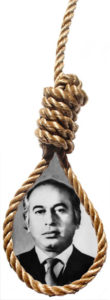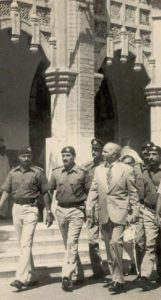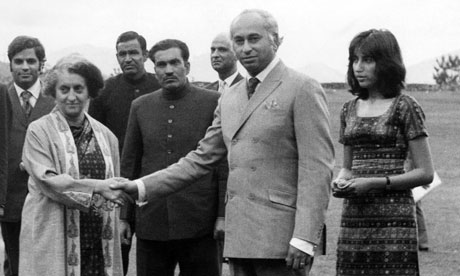Bhutto in the Pakistani Imagination
By Ayaz Amir | News & Politics | Published 14 years ago
 In a land almost condemned to produce plodding and lack-lustre politicians, Zulfikar Ali Bhutto stands out as the perennial exception, as much for his intelligence and energy, and colourful style, as for his ability to transcend class barriers and speak the language of the masses — a surprising trait in a man of his feudal background.
In a land almost condemned to produce plodding and lack-lustre politicians, Zulfikar Ali Bhutto stands out as the perennial exception, as much for his intelligence and energy, and colourful style, as for his ability to transcend class barriers and speak the language of the masses — a surprising trait in a man of his feudal background.
It is a measure of his lasting impact upon the country’s politics that he has been romanticised and demonised in equal measure, either loved, sometimes extravagantly so and with only a remote connection to reality, or hated, this too in extravagant and unrealistic terms. Moderation of sentiment and the path in between, somehow seem distant categories when it comes to a discussion of Bhutto.
To say that his ghostly presence still looms large over the national landscape is probably an overstatement. This is not Bhutto’s Pakistan. This is not even Bhutto’s PPP. But unlike leaders before him and after, he continues to reside in the Pakistani imagination, not so much for what he achieved in power — that being a mixed bag of achievement and tragic shortcoming — as for his courage when he fell from power.
Bhutto in authority was a flawed figure, easy to condemn, too much of an autocrat, often without purpose, unable to stand the slightest opposition or even criticism. But Bhutto deposed is the stuff of legend and poetry.
It is perhaps instructive to remember that by December 1976, which was just before the election process started rolling, Bhutto seemed unassailable, but his rule had acquired a jaded look, as if there was nothing left in his quiver. The Pakistan Peoples Party (PPP), his vehicle to power and glory, had lost its elan and vitality, and the very feudal elements in Punjab which the PPP had routed in the 1970 elections were being brought on board, ostensibly to strengthen the party’s hands in the approaching elections. There was a small coterie of bureaucrats on whose advice Bhutto had come to rely, even when it came to political decisions.
With these bureaucrats in charge, tactical errors were committed which had the unwitting effect of galvanising the opposition. When the elections were announced, the schedule was so compressed that the opposition parties, all nine of them, until then in a state of complete disarray, were almost compelled to get their act together in haste. Under the pressure of the timeline thus imposed, the Pakistan National Alliance (PNA) was formed.
This was an alliance and not a single party and Bhutto was under no compulsion to gift them with a single election symbol. But in one of his biggest miscalculations during that period, that is precisely what the PNA got: a single election symbol, the plough, opposed to the PPP’s arrow.
Then followed a cameo from the theatre of the absurd. Bhutto’s political managers — from the same bureaucratic clique — thought it unbecoming for a leader of Bhutto’s stature to actually involve himself in the heat and dust of an electoral contest. So they arranged for his opponent from his home constituency of Larkana, the Jamaat-e-Islami’s Jan Muhammad Abbasi, to be kidnapped on the day nomination papers were to be filed, thus ensuring Bhutto’s unopposed election.
Not content with this, the same wizards saw to it that the next morning, next to the announcement of Bhutto’s unopposed election, every newspaper in the country carried a photograph of Bhutto’s — a very handsome one, by the way — with the same, identical phrases underneath: “The great leader, the supreme leader, the unrivalled leader.”
Newspapers were meant to choose from these captions, supplied by the Press Information Department, to show variety and spontaneity. But perhaps tired of too much government dictation — the government’s hand being very heavy on the press in those days — they just went ahead and lumped all three together. Even the congenitally slow would not have missed the overkill.
Not willing to be left behind, the four chief ministers also got into the act and ensured that they too were elected unopposed, from their respective constituencies. Although PNA meetings were drawing huge crowds — an opportunity for ordinary people to breathe some fresh air after the Bhutto-imposed suffocation of the previous five years — Bhutto and the PPP were in still in a commanding position and, as every election estimate since then has suggested, would have won the elections without any of these shenanigans. But whom the gods would destroy they first make mad, and this was madness at its finest, bolstering the perception that the elections would be rigged.
The stage was thus set for a full-blown agitation, a stage erected not by the opposition but the government itself. The PNA called for a boycott of provincial elections scheduled for March 10 and voting that day was pretty thin. It was clear that Bhutto had lost the political initiative. (In a strange coincidence, the lawyers’ movement against General Pervez Musharraf began on March 9, 2007. No wonder, Pakistani political commentators are given to making heavy weather of the Ides of March and Shakespeare‘s Julius Caesar is probably the single most quoted English play in Pakistani politics.)
 Lahore was the centre of the PNA agitation and there on April 10 troops opened fire, killing several demonstrators. Three army brigadiers tendered their resignations, a dangerous signal of army unease and unrest. Among the three was Brigadier Niaz of the Qadiani persuasion from the village of Dulmial in Chakwal, who later prospered as an arms contractor and was known to be close to General Musharraf. The Ahmedi Jamaat had passionately supported Bhutto in the 1970 elections but had reason to turn against him when in 1974 he moved the constitutional amendment declaring them non-Muslims.
Lahore was the centre of the PNA agitation and there on April 10 troops opened fire, killing several demonstrators. Three army brigadiers tendered their resignations, a dangerous signal of army unease and unrest. Among the three was Brigadier Niaz of the Qadiani persuasion from the village of Dulmial in Chakwal, who later prospered as an arms contractor and was known to be close to General Musharraf. The Ahmedi Jamaat had passionately supported Bhutto in the 1970 elections but had reason to turn against him when in 1974 he moved the constitutional amendment declaring them non-Muslims.
Beleaguered and increasingly desperate, Bhutto clutched at every straw to defuse the mounting crisis. He got the service chiefs, including General Zia-ul-Haq, to issue a public statement declaring their loyalty to the government and, on the advice of his Minister for Religious Affairs, Maulana Kausar Niazi, came up with several sops to the calls for Islamisation. Gambling and drinking were banned and Friday was declared as the weekly holiday. But to no avail. Far from being impressed, the PNA concluded that Bhutto was on the run.
And almost as if to show that he had lost his political touch, instead of concluding matters with the PNA (negotiations had started) Bhutto spun out the talks — fatally in retrospect — and, as if to compound matters, in June left for an extended tour of the Middle East.
The army was biding its time, the glances of senior army generals narrowing as they saw from close quarters Bhutto’s grip on affairs weakening. For Bhutto had committed almost another cardinal error, when he started inviting to cabinet meetings General Zia-ul-Haq and Lt Gen Faiz Ali Chishti, Commander 10 Corps — the army’s coup-making outfit with its headquarters in Rawalpindi. This was meant to demonstrate his close ties to the army. What it achieved was to lay bare his growing vulnerability.
In his book Ãur Line Kat Gaye (And the line was cut) Kausar Niazi says that at one meeting when he saw Zia and Chishti exchanging glances he knew the game was up.
On July 4, after critical time wasted in haggling over small details, an agreement between Bhutto and the PNA was concluded, but it was too late. The army had already decided to move. Bhutto was arrested and along with other PPP and PNA leaders, shifted to Murree.
The atmosphere was surreal. The long night of the generals had begun, although with Gen Zia announcing elections in 90 days, and sounding very truthful and sincere, it seemed as if the hiatus would be short and democracy would soon return. Zia went up to Murree for what turned out to be a fateful meeting with Bhutto. A photo taken on the occasion says it all: Zia meek and a bit too humble, Bhutto angry and a bit too arrogant.
Bhutto was released and he went to Larkana. From there he came to Multan to the house of the former Punjab chief minister, Sadiq Hussain Qureshi. A few days earlier Zia, while visiting the Lal Masjid in Aabpara, Islamabad (the same mosque against which Musharraf was to launch his ill-destined operation in 2007), on being told that he should try Bhutto, had answered “what more do you want…someone who was in the skies we have pulled down to earth.” In Multan Bhutto could not hold back his riposte, saying that “the person who spoke about pulling me down to earth… one hand of mine will be on his throat and the other somewhere I can’t mention because of the ladies present.”
Towards the evening of his days in power, Bhutto was increasingly down and out, not able to read the pulse or flow of events. But Bhutto Agonistes (Bhutto the combatant) was back to being his provocative and undaunted self. For his fall from grace, his many personal failings and larger political lapses were responsible. His party had very little left in it. The PPP leadership was listless and cowed, capable of issuing resolutions, but little more. But for the resurrection which forms the basis of his legend, his courage alone was responsible.
A lesser man would have been more careful. He certainly would not have taunted Zia and his generals. He would have temporised with his fallen circumstances. Not Bhutto. If Bhutto’s name lives it is not because of the return of the 5,000 square miles of territory captured by India or the return of Pakistani soldiers he successfully negotiated with Indira Gandhi at Simla, or the 1974 Islamic Summit, but because of his courage in the face of death.
Zia was to say later at a cabinet meeting (I have this from Chaudry Arshad, one of Nawabzada Nasrullah Khan’s nominees in the federal cabinet) that it was either his neck or Bhutto’s and he was damned if it was going to be his. Bhutto was picked up on a murder charge and when Justice Samdani of the Lahore High Court released him on bail and in Lahore huge crowds turned out to greet him — almost in the manner when he was at the height of his popularity — the die was cast for Zia and his cohorts and the decision was taken.
Bhutto was picked up again, courtesy a larger bench of the Lahore High Court which cancelled the earlier bail, and his fate entrusted to the tender mercies of Chief Justice Maulvi Mushtaq Hussain, a vindictive and bitter man who hated Bhutto for not making him chief justice.
Maulvi Mushtaq did not try Bhutto. He taunted and humiliated him. And Bhutto, as proud a man as any that walked this land, suffered it all in silence. But he did not flinch.
There are many people who say that Bhutto’s lawyers prolonged the trial unnecessarily and that if such and such a judge had remained on the bench the verdict could have been different. They forget that Bhutto’s trial was taking place against the backdrop of a power play, not the scales of justice. If not this case, some other would have been cooked up. Zia and his generals, small men all, could live with the ignominy of Bhutto’s hanging. Sparing him was a risk the fear in their hearts could not afford.
It doesn’t take much to be arrogant when the sun is smiling on your fortunes. But to remain arrogant and unbending in the shadow of death is not given to everyone. Gen K.M. Arif, Zia’s right hand man, writes that when the death warrant was read out to Bhutto on the late afternoon of April 3, 1979, he went pale and took a couple of steps back. Arif says that this was a sign of his cowardice. I wrote in a review of Arif’s book that if most of us had to spend just one night in a police lockup, our faces would be unrecognisable the next morning. Was momentary pallor such an unforgivable reaction? To Arif’s credit he called me and said that he understood my point of view.
What did Bhutto ask for immediately after being read the death warrant? A shaving kit because, as he told the Jail Superintendent, Yar Muhammad Duryana, “I don’t want to die the death of a maulvi.” Only a fearless man could say such words.
As word of his hanging spread, a pall not so much of grief as of sadness descended on the two cities of Rawalpindi and the then small Islamabad. People spoke in hushed tones, this having nothing to do with being pro or anti PPP but with the feeling that something had happened that should not have happened.
For two, two-and-a half days there were demonstrations in interior Sindh and in some Punjab cities. Zia’s information secretary, the astute Maj Gen Mujibur Rehman (later Lt Gen), was smart enough to allow state-controlled Pakistan Television some liberty to report this unrest. By day three the turbulence had subsided. Paralysed by fear and virtually leaderless, the PPP was able to mount no effective protest, except in parts of interior Sindh, Khaliquzzaman, Amin Fahim’s younger brother, being active in this respect.
The head of the Jamaat-e-Islami leader, Mian Tufail Muhammad, played a sinister role in events connected with Bhutto’s trial and hanging. He was instrumental in convincing the witnesses in Bhutto’s trial not to recant their false testimony, in return for the promise that they would be pardoned once Bhutto was hanged. They were hanged soon thereafter, their relatives protesting that Tufail had deceived them.
Tufail performed another service for Zia, leading a delegation to Saudi Arabia to prevail upon the Saudi leadership next to King Khaled — the king being sick — not to issue an appeal for Bhutto’s life. World leaders had appealed for clemency, but for Zia it was Saudi Arabia’s word alone that mattered. On his return to Pakistan Tufail said that nothing now could save Bhutto. Tufail had allegedly been tortured in prison. Was this his revenge?
In the cables seized from the US embassy in Tehran in 1979 there is one from the American embassy in Islamabad commenting on Bhutto’s hanging…“good riddance” it says. There was no love lost between the Americans and Bhutto.
Bhutto wasn’t tortured before his death. No one came to ask him to sign any papers. This is all gossip and melodrama. Through a common friend I met Abdul Majid, one of the assistant superintendents in Rawalpindi Jail, on the morning of April 4. Open and forthcoming, he said that when he had come to wake Mr Bhutto he found him fast asleep. He marvelled at his strong nerves: so near to death and yet sound asleep. A few days later Majid’s demeanour had changed. He wouldn’t say a word.
Lt Col Rafiuddin who commanded the Punjab battalion guarding ’Pindi Jail during Bhutto’s incarceration and wrote a book about his experiences, and whom I met after reading his book, was far from being a Bhutto lover, but he also, involuntarily I think, testified to Bhutto’s courage.
Mark Tully of the BBC reported that Bhutto’s last words were, “God help me (Allah madad), for I am innocent.” Other accounts say his last words were, “Finish it”…which seem more in character. The Bhutto legend is less about how Bhutto lived and more about how he died. How a man faces death says more about him than anything else.
In March 1981 (again March), after the PIA plane hijacking in Kabul, there was a wave of preventive detentions across the country ordered by the Zia regime. I too found myself in ‘Pindi Jail in a barracks not far from where Bhutto had been kept. On April 4, precisely at two in the morning, the exact time of Bhutto’s hanging two years earlier, I awoke with a start. Was my imagination at work or were spirits of the night rushing past, in remembrance of the awful deed that had occurred here?
Related posts:
The Trial, Part II
Interview: Sardar Mumtaz Ali Bhutto, Chairman, Sindh National Front
Interview: Ghulam Mustafa Khar
Whodunnit?




